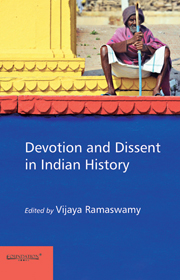Book contents
- Frontmatter
- Dedication
- Contents
- List of Tables and Figures
- Foreword
- Preface
- Introduction: Locating Devotion in Dissent and Dissent in Devotion A Thematic Overview
- Introduction
- 1 Parsing of Devotion and Dissent
- 2 Dissent and Protest in Early Indian Buddhism with Special Reference to Devadatta
- 3 Devotion and Dissent in Hunter's Bhakti
- 4 Devotion and Dissent
- 5 Dissent Within
- 6 Women in Love
- 7 Dissenting Voices
- 8 Dissent in Kabir and the Kabir Panth
- 9 Devotion and Dissent of Punjabi Dalit Sant Poets
- 10 Protest and Counter-protest
- 11 Fakirs of Bengal
- 12 Music in Chishti Sufism
- 13 Dissenting the Dominant
- 14 Devotion and Dissent within the Catholic Church in Late Colonial Bengal
- 15 Narratives of Travel, Voices of Dissent and Attacks on the Colonial Church Fabric of the European Missionaries
- 16 Devotion and Dissent in Narayana Guru
- 17 Sree Narayana Guru's Idioms of the Spiritual and the Worldly
- Contributors
- Index
Introduction
from Introduction: Locating Devotion in Dissent and Dissent in Devotion A Thematic Overview
Published online by Cambridge University Press: 05 October 2014
- Frontmatter
- Dedication
- Contents
- List of Tables and Figures
- Foreword
- Preface
- Introduction: Locating Devotion in Dissent and Dissent in Devotion A Thematic Overview
- Introduction
- 1 Parsing of Devotion and Dissent
- 2 Dissent and Protest in Early Indian Buddhism with Special Reference to Devadatta
- 3 Devotion and Dissent in Hunter's Bhakti
- 4 Devotion and Dissent
- 5 Dissent Within
- 6 Women in Love
- 7 Dissenting Voices
- 8 Dissent in Kabir and the Kabir Panth
- 9 Devotion and Dissent of Punjabi Dalit Sant Poets
- 10 Protest and Counter-protest
- 11 Fakirs of Bengal
- 12 Music in Chishti Sufism
- 13 Dissenting the Dominant
- 14 Devotion and Dissent within the Catholic Church in Late Colonial Bengal
- 15 Narratives of Travel, Voices of Dissent and Attacks on the Colonial Church Fabric of the European Missionaries
- 16 Devotion and Dissent in Narayana Guru
- 17 Sree Narayana Guru's Idioms of the Spiritual and the Worldly
- Contributors
- Index
Summary
Religion has played a Janus-faced role in historical societies all over the world. Religion, on the one hand, has served as the instrument of fundamentalist forces in religion, strengthening and reinforcing canonical stereotypes. It also has the dubious distinction of providing moral justification for acts of violence and terror in the name of religion. On the other hand, religion, especially spirituality, has also been a palpable phase of liberation theologies, such as Protestantism. It has been perceived as a cathartic force providing openings for voices of dissent and resistance. In contrast to sectarian movements which have been fundamentalist in terms of their ideology and locked in schisms and conflicts with those who worshipped ‘differently’, dissent movements within devotional streams were characterized by the qualities of universalism, humanism and love which cut across communal, caste and gender lines.
Beginning from Marx, the entire Marxian tradition has situated religion within the framework of society. An exemplar of this ideological position in the Indian context is D.D. Kosambi, the doyen of Marxist Indian historians. Many of his essays, such as ‘The Social and Economic Aspects of the Bhagawad Gita’ and especially the sub-essay ‘The Social Function of Bhakti’, reflect the firm location of religion as a socio-economic precipitate and bhakti as a reflection of the feudal order.
- Type
- Chapter
- Information
- Devotion and Dissent in Indian History , pp. 3 - 20Publisher: Foundation BooksPrint publication year: 2014

